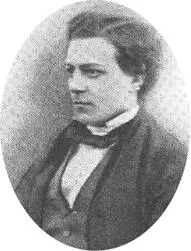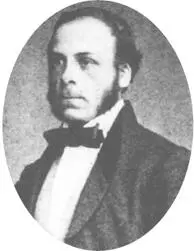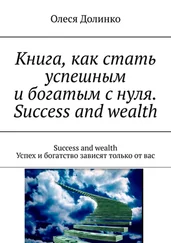Ahead was a battle in which defeat was all too possible. The brothers did not have to dedicate themselves to this struggling enterprise, with its cramped premises in which their offices were scarcely bigger than coffins. ‘It would have been far easier to start a new business, than to pull up a decayed one which had a bad name,’ George said later, looking back on his life. ‘The prospect seemed a hopeless one, but we were young and full of energy.’

George Cadbury in 1861, aged twenty-one, at the time that he took over the failing factory at Bridge Street.

Richard Cadbury in 1861, aged twenty-six.
To the remaining employees of the company, who now had reason to fear for their jobs, ‘Mr Richard’ appeared jovial, relaxed and ‘always smiling’, while ‘Mr George’ was cut from a different cloth, ‘stern but very just’. His unremitting self-discipline and his ability to focus every aspect of his life on one goal became legendary. ‘He was not a man,’ a colleague later observed, ‘but a purpose.’ And what George and Richard decided to do next would become the stuff of family legend.

Richard and George Cadbury were the third generation of Cadbury tradesmen in Birmingham. It was their grandfather, Richard Tapper Cadbury, who had been instrumental in breaking centuries of long association with the West Country and leading the family in a new direction as shopkeepers in the town. At the close of the eighteenth century, as Napoleon prepared for his long march over Europe, the Cadburys, like countless others at the time, exemplified the Britain that the French leader dismissed as a mere ‘nation of shopkeepers’. And just as Napoleon’s scathing remark underestimated his enemy’s real wealth and capacity for war, so it was easy not to see the huge potential emerging from a new generation of shopkeepers whose connections were only just beginning to reach out across the world.
Like many Victorians, the young Richard Cadbury had a fascination with family history, and when travelling he took the opportunity to study ‘the records of his ancestors with thoroughness and affection’. Eventually he compiled a beautifully illustrated Family Book . This shows how his forebears lived as sheep farmers and wool combers in the West Country, their quiet lives marked for centuries by nothing more dramatic than the passing seasons, until 1782 when Richard and George’s grandfather, Richard Tapper Cadbury, set out to learn a trade.
‘Very little is known of his early life,’ writes Richard of his grandfather. ‘He left home in Exeter when he was fourteen on the top of the coach . . . to serve as an apprentice to a draper.’ The young Richard Tapper remembered the morning of his leaving: ‘My father and mother got up early to see me off by the stage . . . and I thought my heart would break.’
Richard Tapper was apprenticed to a draper 150 miles away in Kent who supplied uniforms to troops fighting in the American War of Independence. Within a year the war ended, the troops were demo-bilised and the business went bankrupt. Richard Tapper secured another position as an apprentice in Gloucester, where by the age of nineteen he was proud to receive wages of £20 a year. After ‘scrupulously and conscientiously’ avoiding any ‘unnecessary gratification’, he reassured his parents in Exeter, it was possible for him to pay for his own washing and ‘appear so respectable as to be invited as guest among the first families of Gloucester’. His next move was to London, to work for a linen draper and silk mercer in Gracechurch Street. His wages eventually rose to £40 a year, which not only enabled him to ‘maintain a respectable appearance’ but also to ‘purchase many books’.
After ten long years mastering the trade, Richard Tapper was longing to start a draper’s business of his own. He was dissuaded from his youthful dream of sailing for America by a family friend, who warned him ‘that the country is still far from settled’. Nor could he seek adventures in Europe, with France in the frenzied grip of Robespierre’s Reign of Terror and at war with its neighbours. So in 1794, equipped with much enthusiasm and, through the Quaker network, quite a few references, he took the stage to Birmingham with a friend, Joseph Rutter. They had heard of an opening for a linen draper and silk mercer in the town, and seized their chance.
The draper’s shop at 92 Bull Street was soon successful enough for Richard Tapper to buy out his partner and start a family. He married Elizabeth Head in 1796, and seven children followed over the next seven years. Elizabeth still found time to help in the shop, dressing the windows with fine silks and linens and taking an interest in the changing fashions. One year they were obliged to enlarge their front door to accommodate the fashion for puffed ‘gigot’ sleeves, strengthened with feather pads or whalebone hoops. Records show that Richard Tapper’s business was so successful that in 1816 a second shop at 85 Bull Street was also registered in his name.
The stories that survive in Richard Cadbury’s Family Book provide a vivid glimpse into his grandfather’s life. One of the problems Richard Tapper had to deal with was theft. After repeatedly losing silk that cost up to twelve shillings a yard, he felt he had to take action, but soon came to regret it. He stopped a woman in his shop who had two rolls of silk hidden under her cloak. When he went to court to hear the outcome of her trial, to his alarm the judge sentenced the woman to death. ‘I was appalled,’ Richard Tapper told his children years later, ‘for I never realised what the sentence would be. Without delay I posted to London, saw the Secretary of State and got the woman’s sentence commuted to transportation.’ Given that this was a time when it took almost two days by ‘Flying Coach’ – with fresh horses staged down the line – to reach London from Birmingham, this required considerable commitment.
As a Quaker, Richard Tapper became deeply involved in community affairs, and served on the Board of Street Commissioners for Birmingham, a precursor to the Town Council. He also worked as an Overseer of the Poor, including during the troubled year of 1800, when the harvest failed. According to the St James Chronicle , on 8 October the price of bread rose to nearly two shillings for one loaf. In the Parish of Birmingham the poor were in dread of starvation, ‘the distress in the town was great’, and there was ‘an alarming disorder’ in the workhouse. Richard Tapper was among those who tried to ensure that there was enough food.
Richard Tapper’s business prospered, and his garden at the back of 92 Bull Street became a favourite spot for his growing family, with ‘currants in abundance, flowers and a vine’. The accounts of Richard’s children are of particular personal interest since my own branch of the family can be traced to his oldest son, Benjamin, born in 1798. According to the Birmingham Daily Post , Benjamin had a passion for philanthropy. Among the many benevolent causes he supported were the local Infant Schools, the Bible Society and the Society for the Suppression of Cruelty to Animals. But like many Quakers, stated the Post , by far his ‘most laborious and anxious labours’ were devoted to the anti-slavery movement, ‘which more or less occupied his time and unwearied attention for upwards of thirty-five years’. When Benjamin turned thirty he inherited his father’s successful draper’s shop on Bull Street, and was happily settled there for many years.
Читать дальше















